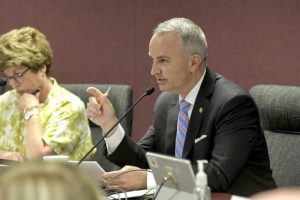Less service, more pay: Missouri state rep. cautions on 4-day school week as levy increase passes
Proponents of a shortened school week aren’t asking what is best for the kids, says a Missouri lawmaker who represents a large district moving to four days per week while promising teacher…

Proponents of a shortened school week aren’t asking what is best for the kids, says a Missouri lawmaker who represents a large district moving to four days per week while promising teacher raises.
Missouri’s Independence School District (ISD) is featured this week in a CBS News article that champions the new shortened school schedule being introduced in districts around the country.
“As kids head back to school this year, a growing number will be returning to a four-day school week,” the article reads.
But Missouri Rep. Aaron McMullen, whose district includes Independence, says the debate about the policy too often leaves student outcomes out of the discussion.
“What is conspicuously absent from the concept is what is best for the children,” McMullen told The Lion.
For example, even though a district might get a short-term benefit from teacher recruitment by using a four-day schedule, McMullen wonders how a four-day school week will help kids adapt to a workforce that will require them to work five days or more per week.
But there are other issues, too.
“It was touted as a way for rural districts to save money, but, in fact, the four-day school week will not save any money for the district,” he said.
Indeed, ISD put a mill levy increase on the ballot, which easily passed on Tuesday – revenue the district says it will use to increase teacher pay.
“It’s kind of a case of reverse and double taxation. They are reducing the number of services with a shortened school week and asking for more money,” McMullen said.
The levy increase was an unusual one, says David Stokes, director of municipal policy for the Missouri-based Show-Me Institute, in that the ballot proposal asked for a 20 cent increase in the operating levy with a 30 cent decrease in the debt service levy, resulting in an overall decrease.
However, as assessed property values skyrocketed this year in the district, which promise to increase school revenues, the district promised to reduce the debt service levy by 40 cents and only increase the operating levy 8 cents if the levy proposal passed.
“They’ve promised to do that,” Stokes told The Lion. “Now, obviously, it’s up to voters and city residents to hold them to that promise going forward as they set their tax rates.”
Stokes is also concerned about the practice of using June and August special elections, which have very low voter turnout, to pass such measures.
“We need limits on these really obscure June and August special elections in even numbered and odd numbered years,” Stokes said. “We need to be holding far more of these ballots on the even year August or November elections, or just the standard April municipal election day, every year.”
Nearby Kearney, Missouri voters soundly rejected a proposed tax increase by its school on Tuesday.
In Independence, some parents are faced with other increased costs due to the shortened school week, including parents of special needs kids and single or working moms, who will have to pay extra money for daycare when school is closed.
ISD will offer additional services to those parents for care during the off day, but the school admits the service will cost families $1,200 a year for those 30 days. Families who use the service may wonder why they’re paying more than before while their children get one less day of school.
McMullen tells The Lion that he is not dead set against a four-day school week, but outside of using it as a teacher recruitment tool, it has a mixed track record.
He pointed to rising crime rates, delinquencies, and other problems with juveniles that have accompanied a shortened school week in other places it’s been tried around the country.
When combined with negligible academic benefits of a shorter school week in a public school environment that’s already struggling to maintain the status quo, people should have some measure of caution about the new schedule, said McMullen.
“I think we should be trying to improve academics, not just maintain them,” he added.
In fact, a variety of studies show that a shortened week of school can adversely affect academic performance, or have no effect at all.
McMullen said that’s because there are big differences across demographics when it comes to school districts.
Independence, for example, might have been considered a rural school district 50 years ago, but today, it’s firmly a suburb of Kansas City.
“Independence isn’t some rural school district. It’s the 5th biggest district in the state. When you look at the studies that have researched this issue [of shortened school weeks], it’s not surprising that there’s no consensus, because school districts have a wide variety of demographics,” McMullen said.



